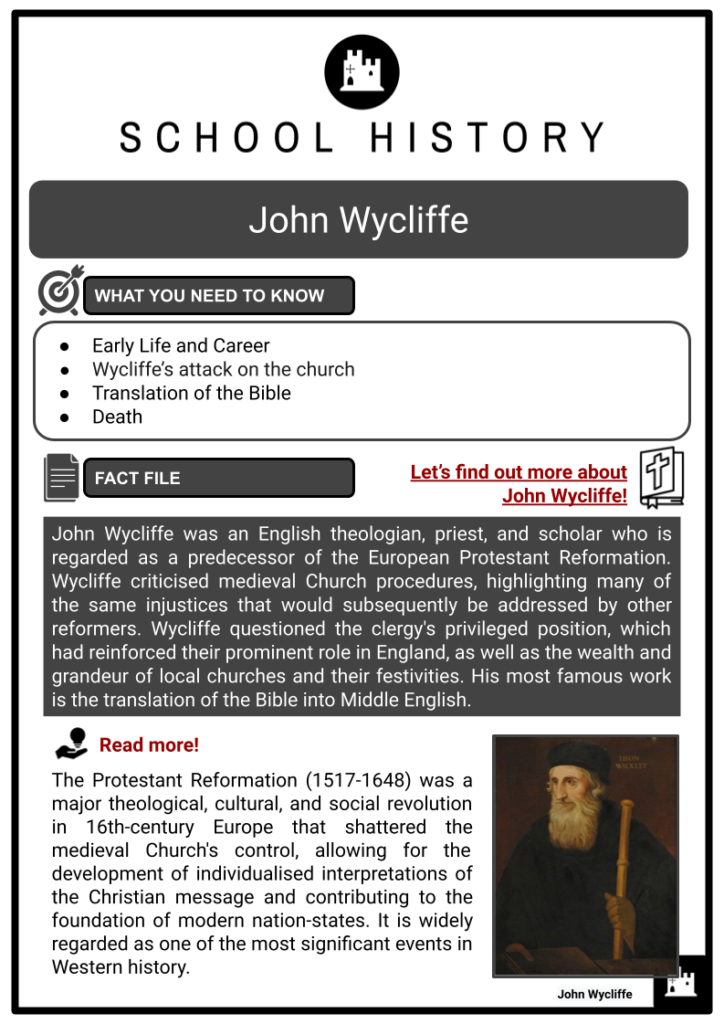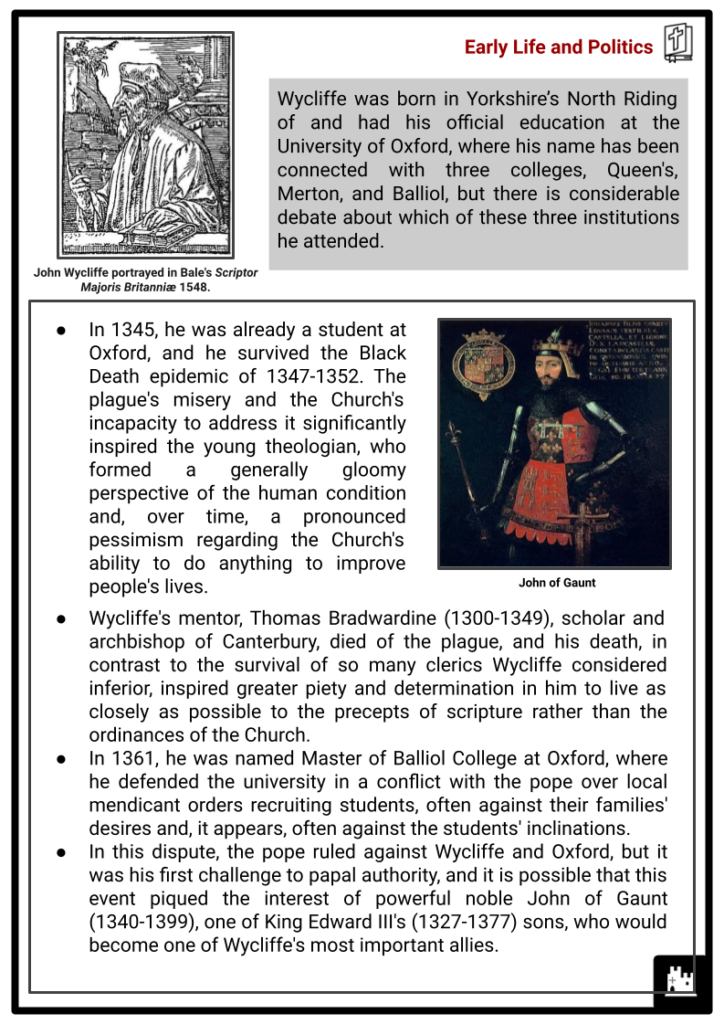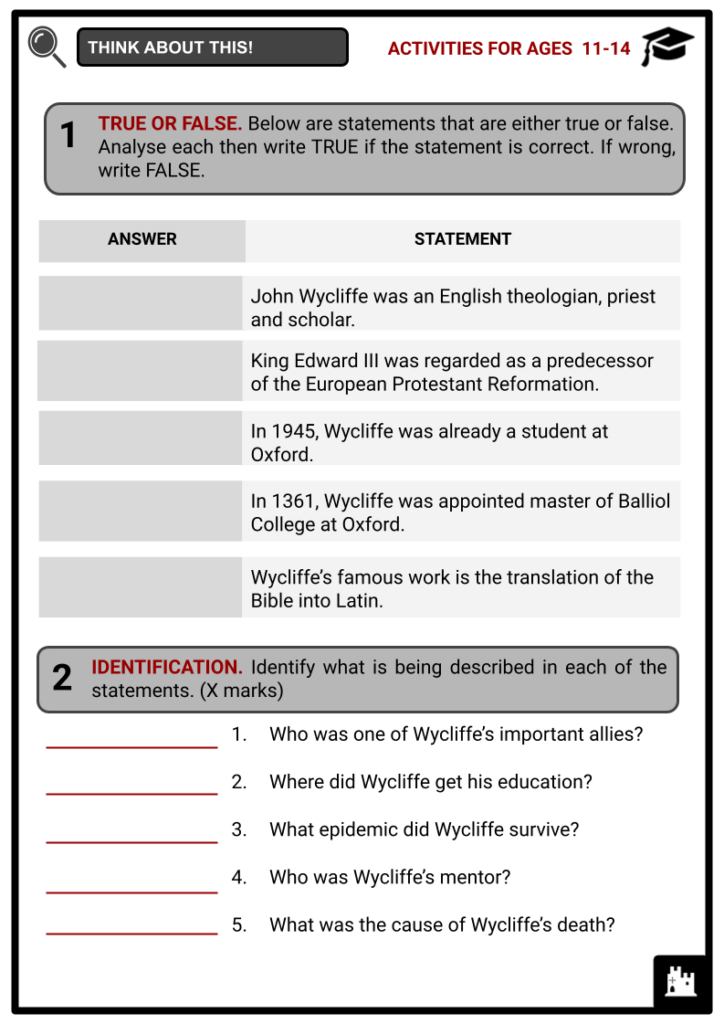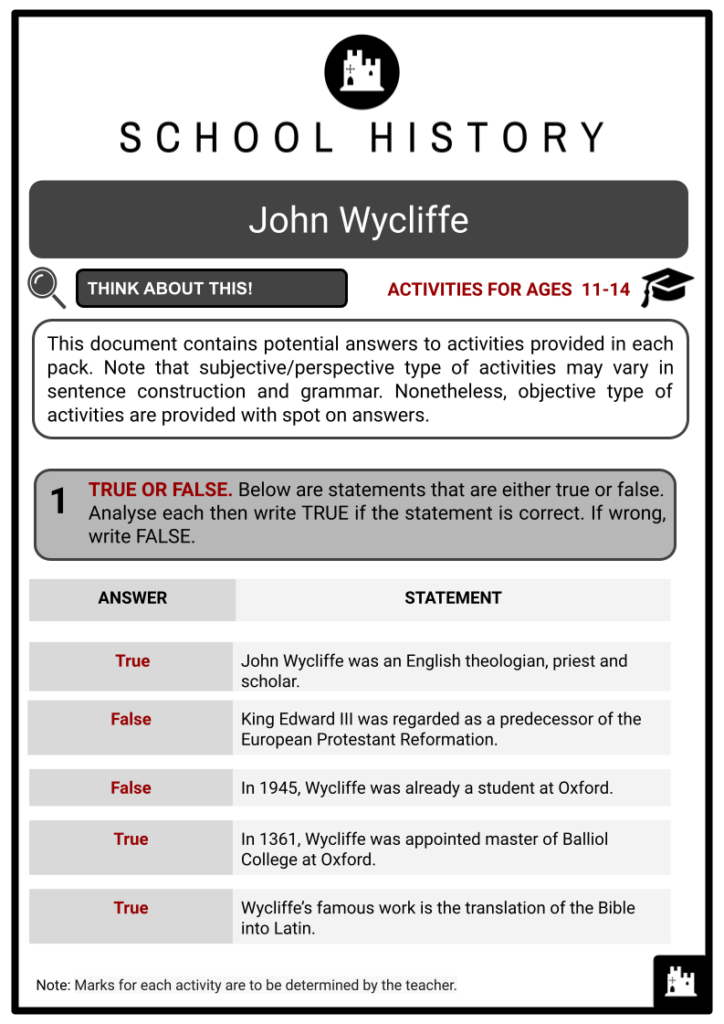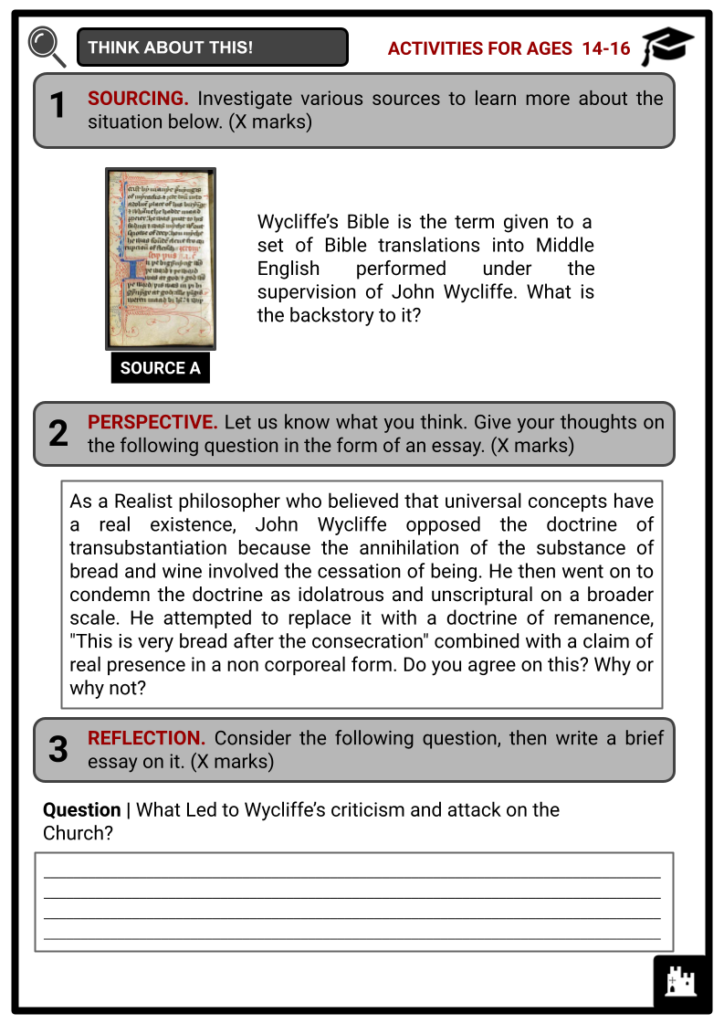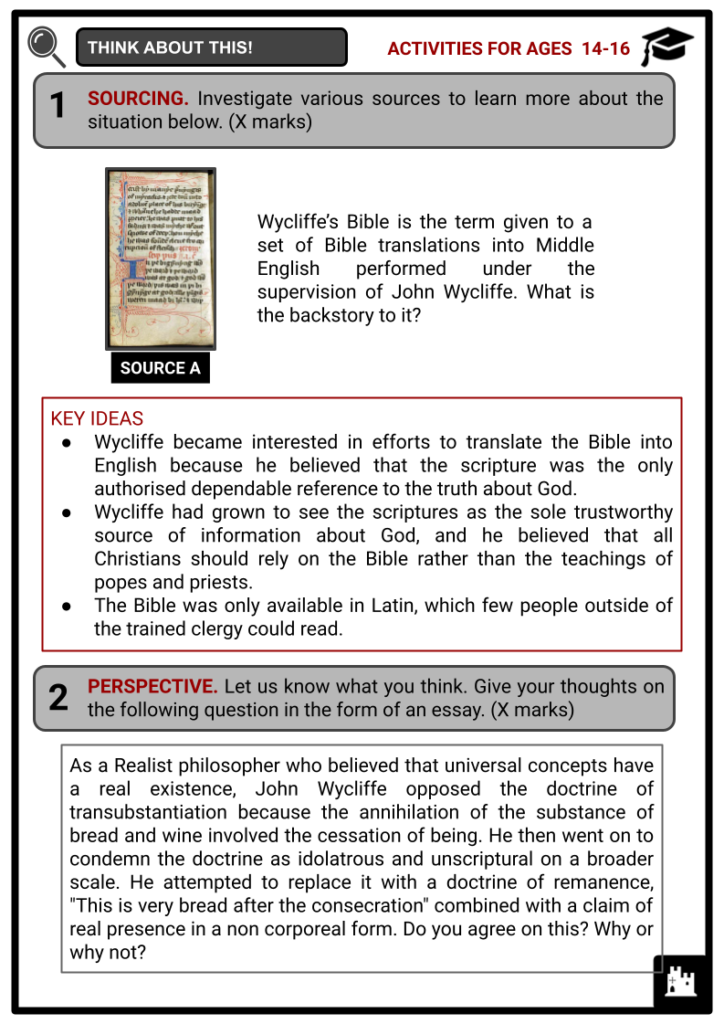John Wycliffe Worksheets
Do you want to save dozens of hours in time? Get your evenings and weekends back? Be able to teach about John Wycliffe to your students?
Our worksheet bundle includes a fact file and printable worksheets and student activities. Perfect for both the classroom and homeschooling!
Summary
- Early Life and Career
- Wycliffe’s attack on the church
- Translation of the Bible
- Death
Key Facts And Information
Let’s find out more about John Wycliffe!
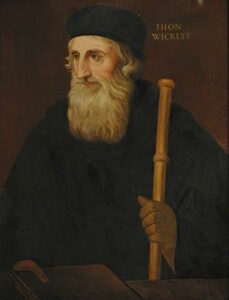
John Wycliffe was an English theologian, priest, and scholar who is regarded as a predecessor of the European Protestant Reformation. Wycliffe criticised medieval Church procedures, highlighting many of the same injustices that would subsequently be addressed by other reformers. Wycliffe questioned the clergy's privileged position, which had reinforced their prominent role in England, as well as the wealth and grandeur of local churches and their festivities. His most famous work is the translation of the Bible into Middle English.
Read more!
The Protestant Reformation (1517-1648) was a major theological, cultural, and social revolution in 16th-century Europe that shattered the medieval Church's control, allowing for the development of individualised interpretations of the Christian message and contributing to the foundation of modern nation-states. It is widely regarded as one of the most significant events in Western history.
Early Life and Politics
- Wycliffe was born in Yorkshire’s North Riding and had his official education at the University of Oxford, where his name has been connected with three colleges, Queen's, Merton, and Balliol, but there is considerable debate about which of these three institutions he attended.
- In 1345, he was already a student at Oxford, and he survived the Black Death epidemic of 1347-1352. The plague's misery and the Church's incapacity to address it significantly inspired the young theologian, who formed a generally gloomy perspective of the human condition and, over time, a pronounced pessimism regarding the Church's ability to do anything to improve people's lives.
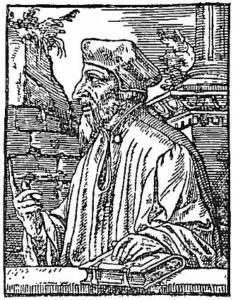
John Wycliffe portrayed in Bale's Scriptor Majoris Britanniæ 1548.
- Wycliffe's mentor, Thomas Bradwardine (1300-1349), scholar and archbishop of Canterbury, died of the plague, and his death, in contrast to the survival of so many clerics Wycliffe considered inferior, inspired greater piety and determination in him to live as closely as possible to the precepts of scripture rather than the ordinances of the Church.
- In 1361, he was named Master of Balliol College at Oxford, where he defended the university in a conflict with the pope over local mendicant orders recruiting students, often against their families' desires and, it appears, often against the students' inclinations.
- In this dispute, the pope ruled against Wycliffe and Oxford, but it was his first challenge to papal authority, and it is possible that this event piqued the interest of powerful noble John of Gaunt (1340-1399), one of King Edward III's (1327-1377) sons, who would become one of Wycliffe's most important allies.
- On 7 April 1374, Edward III appointed Wycliffe to the rectory of Lutterworth in place of Ludgershall, and it was around this time that the theologian developed an interest in politics. He received a royal commission to the deputation sent to Brugge to discuss the outstanding differences between England and Rome, such as papal taxes and appointments to church posts. Wycliffe demonstrated in this work that he was both a patriot and a king's man.
- Pope Gregory XI had condemned him by 1377 for his treatise 'On Civil Dominion', which enlarged on the theological reasons he had given in 1374. Wycliffe had also begun to use his position as pastor at Lutterworth to criticise the pope and the church hierarchy as corrupt and land-grabbers.
- His fundamental point in 'On Civil Dominion' was that the Church had no business collecting vast expanses of property and should hand them over to civil authorities, return to the simplicity of Jesus and his disciples, and live in poverty like them in order to better serve the people.
- The alliance with Gaunt enraged his religious authorities, who called him to appear before them in February 1377. The hearings broke out in chaos, and Wycliffe walked away unmolested and uncondemned. Wycliffe was at the pinnacle of his reputation and influence that year.
Did you know?
Pope Gregory XI presided over the Catholic Church from 30th December 1370, until his death in 1378. He was the seventh and final Pope of Avignon, as well as the most recent French Pope acknowledged by the contemporary Catholic Church. Gregory XI restored the Papal Court to Rome in 1377, bringing an end to over 70 years of papal residence at Avignon, France.
Wycliffe’s attack on the church
- Wycliff returned to Lutterworth and, from the privacy of his study, launched a systematic assault on the church's beliefs and practises.
- His main target was the doctrine of transubstantiation, which holds that the substance of the bread and wine used in the Eucharist is transformed into Christ's body and blood.
- As a Realist philosopher who believes that universal concepts have a real existence, he opposed it because the annihilation of the substance of bread and wine involved the cessation of being. He then went on to condemn the doctrine as idolatrous and unscriptural on a broader scale. He attempted to replace it with a doctrine of remanence, "This is very bread after the consecration" combined with a claim of real presence in a non corporeal form.

Wyclif Giving "The Poor Priests" His Translation of the Bible - Wycliffe pressed his ecclesiastical attack. The pope, cardinals, secular clergy, monks, and friars were all chastised in language that was harsh even by 14th-century religious standards. His active, inquisitive mind was matched by a quick temper and a never-ending supply of invective.
- Despite his disappointment at not receiving desirable church positions, his attack against the church was not solely motivated by rage. It was marked by moral sincerity and a real desire for reform. He pitted himself against the largest organisation on the planet because he honestly believed it was wrong, and he had the grace to admit it even if he stated it in nasty terms. His ingenuity must also not be overlooked.
Translation of the Bible
- Wycliffe became interested in efforts to translate the Bible into English because he believed that scripture was the only authorised dependable reference to the truth about God.
- Wycliffe believed that all Christians should rely on the Bible rather than the teachings of popes and priests. He claimed that there was no scriptural basis for the pope.
- The Bible was only available in Latin at the time, and few individuals outside of the clergy could read it. Any suggestion that the Bible be translated into a period vernacular, such as English, was regarded as heresy, and anyone who attempted it was regarded as a mortal threat to the Church.
- From August 1380 through the summer of 1381, Wycliffe was at his Queen's College quarters, working on his ideas for a Bible translation and an order of Poor Preachers to bring Bible truth to the people.
- At his request, two translations were created, one more idiomatic than the other. The most plausible explanation for his great toil is that the Bible became a need in his beliefs to replace the discredited authority of the church and to make God's law available to everyone who could read. This, along with a conviction in the power of preaching, resulted in the founding of the Lollards.
Read more!
Lollardy was a religion based on colloquial scripture. Lollards criticised numerous Catholic church traditions. The Lollards rejected the church's rituals of baptism and confessing as vital for salvation. They were seen praying to saints and worshipping their pictures as a form of idolatry. Oaths, fasting, and prayers for the deceased were regarded to be unbiblical. They were dissatisfied with the trappings of the Catholic Church, such as holy bread, holy water, bells, organs, and church structures. They discounted the significance of papal pardons.
Death and Legacy
- In the years leading up to his death in 1384, he progressively claimed that the Bible was the authoritative centre of Christianity, that the papacy's claims were unhistorical, that monasticism was irredeemably corrupt, and that priests' moral unworthiness invalidated their office and sacraments.
- The news that John Wycliffe was dying swept over England like a storm. On this day, 30th of December, 1384, clergy, many of them his adversaries, swarmed into his Lutterworth quarters. If they were hoping for a final remark or a repentance from him, they were let down. John was unable to communicate.
- Wycliffe suffered his first stroke in Lutterworth, although he continued to write prolifically until his death in December 1384 from a second stroke. He had fallen and gotten numb while saying mass two days prior. When he awoke after his second stroke, he was paralysed and unable to talk.
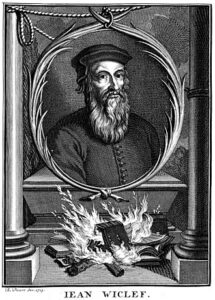
Portrait of John Wycliffe by Bernard Picart, showing the burning of his works (1714) - On the last day of the year, John Wycliffe died of a stroke. The ecclesiastical authorities had never excommunicated him because they were afraid of public opinion; the people adored John, and his celebrity was global. As a result, he was buried in sanctified ground.
- The church remembers John Wycliffe fondly. After his death, authorities dug up his body, cremated his remains, and scattered the ashes. They still couldn't get rid of him. Despite being repressed, Wycliffe's teachings spread.
- Finally, we can see how Wycliffe's significance in English history stems from intellectual, political, and religious concerns. Wycliffe's amazing capacity to generate a huge number of texts allowed him to see problems in the Oxford system and speak out against them.
- John Wycliffe traveled throughout the land delivering the Bible to the ordinary people of their own language, educating "poor preachers" who lived simply. He is called the "Father of English Prose" because the simplicity and appeal of his writings and preaching in the Middle English language influenced how we speak today.
- Wycliffe's impact on Bohemians affected the momentous Protestant Reformation of the early 16th century even though his English followers, known as Lollards or Wycliffites, were persecuted and nearly exterminated in England.
- While being quite active politically and religiously, he produced several books and served in different assigned ecclesiastical roles. Wycliffe's achievements were significant in a career that stretched over two decades. Oxford was Europe's most prestigious institution in the 14th century, and John Wycliffe was its prominent theologian and philosopher.
- Wycliffe left a legacy of power and reputation. He was one of England's most influential religious personalities. Two of his most important efforts were to inspire a religious revival and to write the first English translation of the Bible.
Image Sources
- https://upload.wikimedia.org/wikipedia/commons/thumb/b/b8/Wycliffe_by_Kirby.jpg/330px-Wycliffe_by_Kirby.jpg
- https://upload.wikimedia.org/wikipedia/commons/thumb/e/e0/John_wycliffe_scriptro_majoris_britanniae_1548.jpg/330px-John_wycliffe_scriptro_majoris_britanniae_1548.jpg
- https://upload.wikimedia.org/wikipedia/commons/thumb/4/4f/WycliffeYeamesLollards_01.jpg/330px-WycliffeYeamesLollards_01.jpg
- https://upload.wikimedia.org/wikipedia/commons/thumb/8/86/Portrait_of_John_Wycliffe.jpg/330px-Portrait_of_John_Wycliffe.jpg

